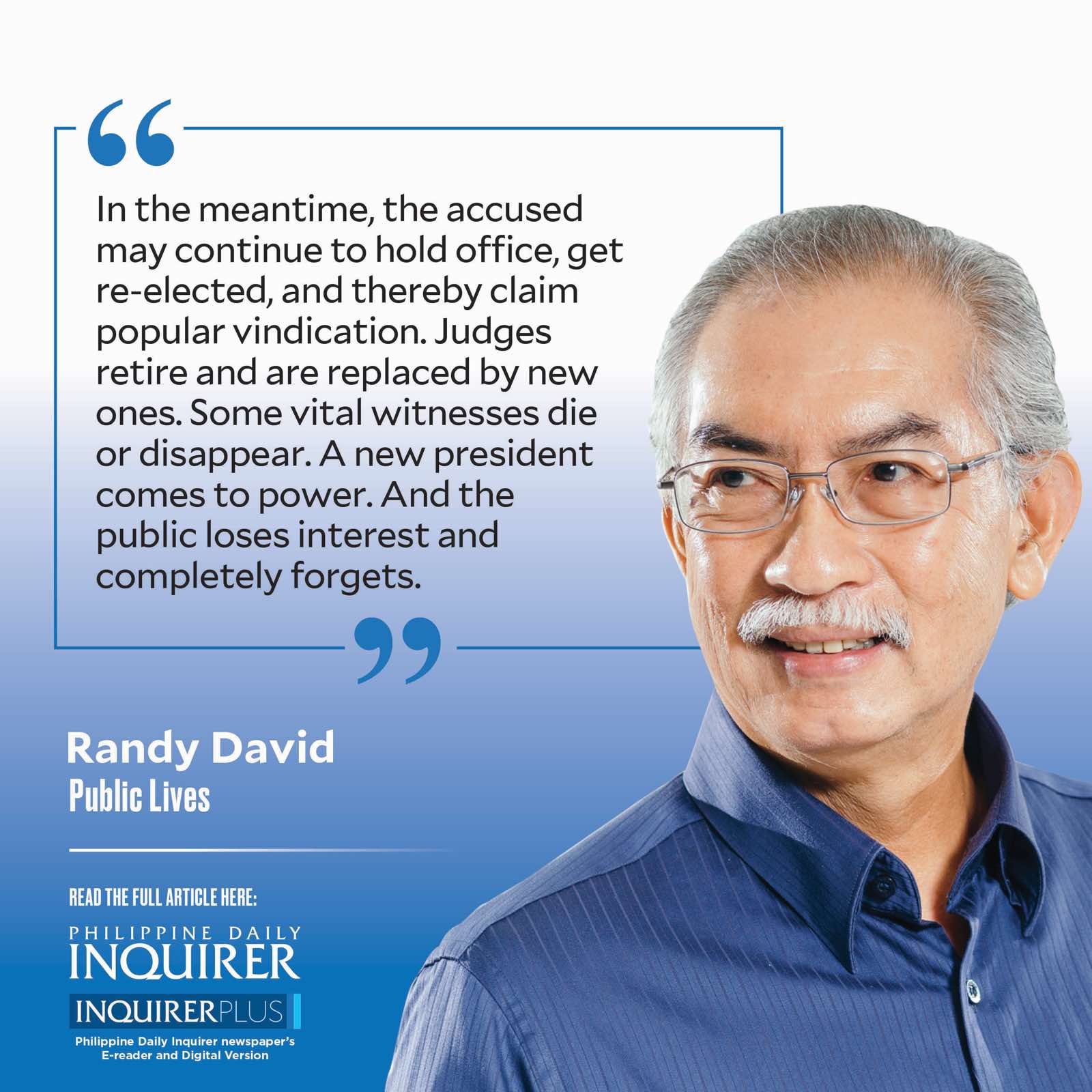Postscript to the Napoles ‘pork’ scam

The headlines of the major dailies the other day were about an incumbent senator’s simultaneous exoneration and conviction. The Inquirer put it thus: “Jinggoy guilty of bribery, cleared of ‘pork’ plunder” (News, 1/20/24). This was echoed by The Star’s header: “Jinggoy convicted of bribery, cleared of ‘pork’ plunder.” But the Manila Times summed it all up simply as: “Graft court clears Jinggoy of plunder.”
I think the Times’ version comes closest to the core message of the Sandiganbayan decision, and Sen. Jinggoy Estrada’s lawyers are right to claim victory. The anti-graft court ruled that there was no plunder because the amount of public money that was alleged to have been stolen was less than P50 million. But, as though needing to achieve some balance, the court added that less serious offenses of direct and indirect bribery were however committed when Estrada accepted bribes that were less than the threshold amount for plunder cases.
As significant, the court accepted without question Estrada’s claim that he later returned to Janet Napoles the money she had sent him (through Ruby Tuason) in exchange for his endorsement of the former’s nongovernmental organizations (NGOs). This acknowledgment permits the senator to insist that he did not pocket a single centavo from his Priority Development Assistance Fund and that therefore, his conscience is clear. Without any doubt, it also constitutes a perfect ground to file a motion for reconsideration or an appeal to complete his exoneration. The average reader cannot be faulted for being confused by the seeming ambivalence of the ruling. A cursory reading of the 396-page decision did not make things any clearer for me, I’m afraid. Maybe, like China’s advice to President Marcos, I should read more to understand. I admit that the ways of the law are, for nonlawyers like me, sometimes difficult to fathom.
The decision states that the original amount of the actual damages sustained by the government is P262,034,000. This represents “the actual … public funds transferred [to two NGOs of Napoles.]” This is the same amount of money that Napoles is being ordered to pay as civil liability in this particular case. But, of course, it cannot be assumed that all of it went into the pockets of Estrada.
Bank documents secured through the Anti-Money Laundering Act showed that indeed only a small fraction of this amount—certainly less than P50 million—can be proven to have been transferred to Estrada’s accounts within the crucial period indicated in Benhur Luy’s “record of rebates.” More importantly, of the funds credited to Estrada’s bank accounts during that period, some entries could not be directly ascribed to his dealings with Napoles. Therefore, these should be further deducted from the final amount. That, basically, is how the threshold of P50 million was whittled down to less than P10 million.
In fact, of this remaining amount, the bulk (P8.87 million) was shown to have been received by Pauline Labayen, deputy chief of staff of the senator, supposedly on behalf of her boss. But whether in fact she turned over the money to her boss could not be proven. Labayen has been missing since this story broke out and has been declared a fugitive.
Estrada’s exoneration follows nearly the same pattern as the earlier release from detention and eventual exculpation of his two colleagues, former senator Juan Ponce Enrile and Sen. Bong Revilla. The brunt of the charges against all three men was subsequently borne by their respective chiefs of staff.
Someday, a social scientist with a good grasp of politics and the legal system will write a useful thesis on what basically ails government in our society. The thesis will draw much of its research material from newspaper accounts and court documents pertaining to the abuse of legislators’ pork barrel allocations. It will show why corruption is an integral part of politics and why political power trumps almost every other kind of power in this country. It will show why it is extremely difficult to prove anything against an incumbent legislator in our courts, unless a more powerful politician, like the president, or anyone with close connections to the latter, is seriously bent on seeing him/her in jail. It will demonstrate how, with the help of skillful lawyers who know how the courts work at every stage, an accused elected official is able to exhaust all available legal remedies to avoid being put in jail.
Cases like this can go on almost indefinitely until the public outcry that prompted the filing of cases has all but dissipated. In Estrada’s case, it took 10 long years from the filing of the case at the Sandiganbayan before a verdict was handed down. It’s almost impossible to pinpoint responsibility for the delay. In the meantime, the accused may continue to hold office, get re-elected, and thereby claim popular vindication. Judges retire and are replaced by new ones. Some vital witnesses die or disappear. A new president comes to power. And the public loses interest and completely forgets.
In the near future, artificial intelligence (AI) tools trained on incredible amounts of information available online will make it virtually impossible for us to forget, or to easily forgive. AI programs will have the capacity to review even the lengthiest court rulings for the consistency of their arguments and the validity of their conclusions—all in the blink of an eye.




















